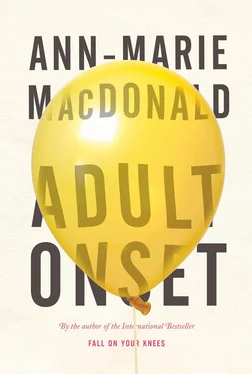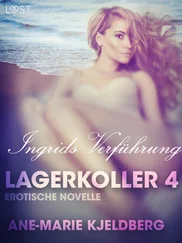•
It is snowing. Outside her kitchen windows, the sky has turned opaque and produced a razzle of crazy flakes. Mary Rose is barely able to make out the fence much less the hopeful crocuses on the ground — it is as if February had snuck up on April, whacked it on the head and taken its place. She turns on the radio, Hi there, and happy Wednesday … The mummified Christmas cake sits on the counter looking like something from the Royal Ontario Museum.
She wonders if it is freezer-dead or if it can be resurrected. She should learn to make these things. Andy-Patrick makes their mother’s Lebanese Easter bread, she should get him to come over and show her how. Her kids are not growing up with the same smells as she did, they don’t have a mother who covers her hair with a cloth diaper and flips dough in the air while singing made-up words to Carmen . A mother who uses Arabic endearments. And calls them “demon.” And chases them through the house with a wooden spoon. And threatens to “annihilate” them, and swears to “massacre” them. And promises to “smash” them. And wears Chanel No. 5 and moonstones.
She belongs in the loony bin is what she heard Maureen mutter that day when they escaped in the car. It made Mary Rose feel something beyond sad or scared or even ashamed — those are clean words that can be read and said — it made her feel like there was tar melting inside her.
From then on it seemed the days when their mother yelled and failed to change out of her nightgown or do her hair were coming up more frequently in the revolving bingo ball of life. The Dolly who canvassed for the Heart Fund and the Liberal Party, ran the Catholic Women’s League, conducted the choir, made her own wine with a catheter tube and two vats, balanced the bank book, sewed matching outfits and regularly fed an army of guests was less in evidence. “C’mere till I smash you.” When hollered, it was no more than turbulence, but when spoken with level tone and lowering gaze it was terrifying. Mary Rose was nine and standing in the kitchen. Slaps and pinches, yanks and shoves, were merely sticks and stones, but words hurt. On this day the words issuing from her mother were dark and heavy, and she was immobilized under the weight of them, able neither to put up an arm against them nor outrun them, laughing. She saw herself from behind and slightly above, as though she were hovering near the ceiling. Then she witnessed a kind of miracle — it did not cross her mind to attribute it to Our Lady, so perhaps it was more of a scientific phenomenon: she watched as a transparent but impermeable shield like a force field took shape around her, and suddenly she was back in her body, behind her own eyes, within a hard transparent dome. She saw the dark shapes of her mother’s incoming words stop short upon contact with it, and fall to the floor, and she understood, “They are just sounds.”
Behind her, on the floor, Maggie is “swimming” in a laundry basket full of plastic balls — an idea Mary Rose got from a McDonald’s they stopped at in desperation on the 401 last summer.
Now is Mary Rose’s chance to slip into the living room, lie down on the couch and close her eyes — ten minutes is all she needs. Churchill napped, naps won the war. As long as she’s lying down, she can’t lose her scissors, her yoga mat or her temper, as long as she is lying down nothing bad can happen. But she returns the cake to the stainless steel drawer, so like a morgue, and closes her dented freezer. “Let’s go pick up your brother and Youssef from school now.”
At the back door steps she gets Maggie into her snowsuit no problem, but the child balks at the boots.
“Sitdy boots.”
The phone rings. A long-distance ring.
“Maggie, it’s snowing, you need your winter boots this time.”
Ring ring .
Maggie kicks her. Mary Rose sighs and takes her firmly but gently by the shoulders, focusing the child’s attention just as the books advise. She does not feel angry. “Maggie, you may not kick Mumma.”
Maggie hits her in the face.
“NO!”
She seizes the little arms, “STOP IT!” resisting the impulse to lift her child and slam her back down onto the steps. “DON’T DO THAT!” Resisting the impulse to yank her up, up from the steps and haul her across the kitchen floor by the elbow — instead she rages into the child’s face, “DON’T YOU EVER HIT ME!” She is not doing it, but she can see herself doing it. Up by the elbow like a chicken by the wing, and the more she does not do this, the harder she squeezes, as though to keep herself from merging with the phantom self that is giving in to lust, sobbing for release, the desire to — her hands spring open, “I DIDN’T HURT YOU!” The crazy words hang in the air, black and straining, leashed. Maggie is screaming. Mary Rose hears Daisy clicketing across the kitchen floor. The dog arrives on the top step, riding-crop tail going a mile a minute.
Mary Rose is faint with anger. Her breath is shallow. Her hands drop to her sides — nothing bad is going to happen, she knows how to make parts of her body go dead. Daisy mwuff s and mashes her wet muzzle against Mary Rose’s throat.
“It’s okay, Daisy.” She breathes and stares up at a corner of the ceiling. She hears Maggie rustling. Hears her say, “Do it Me-self.”
She risks moving her hands, but only to thrust them safely into her pockets, withdrawing her left one suddenly with a yelp. She is bleeding. She has pricked her finger … She reaches back in and fishes out the broken unicorn. She mounts the stairs calmly, leaving Maggie to her boots. She puts the unicorn and its head on the kitchen counter and runs cold water over her finger.
How do you tell yourself what you already know? If you have successfully avoided something, how do you know you have avoided it? Land mines of anger left over from a forgotten war, you step on one by chance. Sudden sinkholes of depression, you crawl back out. A weave of weeds obscures a mind-shaft but cannot break a fall, you get hurt this time. A booby-trapped terrain, it says, “Something happened here.” Trenches overgrown but still visible from space, green welts, scars that tell a story. You press on.
Years pass and you become aware of a blind spot. A blank. White as bone. A strip of mind where fear has scorched consciousness clean, obliterated fingerprints, freckles, follicles. Smooth as a stone slab.
As an old scar.
•
When she woke up in the recovery room, her throat was sore and she thought she was back in Hamilton with her tonsils out. She was very thirsty. She was lying on a hard, narrow bed on wheels called a gurney, which sounded like a type of cow. Right next to her was another gurney with a bulging sheet on it. The sheet was going up and down. A noise was coming from it. A farmyard sound. Like a cow. She managed to turn her head enough to see that it was a person. A fat old man with something like a gas mask over his face except it was see-through. A plastic snout. His eyes were closed and a tube was coming out of his mouth. It was the same kind of tube that her mother siphoned homemade wine with … there was a foamy streak in it. She turned her face to the ceiling. She tried to ask for water, but no sound came out. After a while a nurse came with a tiny paper cup like the kind you get at the dentist’s. She tried to swallow but could not and the water trickled out the side of her mouth. She wanted more, but the nurse said no, it was not safe. She saw yellow paint on her chest, and a blood patch on the white bandage, and remembered it was her arm not her tonsils.
•
“A lesbian gave me this mug,” said Dolly in 1982, so Mary Rose thought it might be safe to come out.
They were in Dolly’s kitchen in Ottawa — she had a nice part-time job as staff nurse in a government building, and the lesbian had confided in her, asking for advice on how to talk to her own mother. Dolly must have helped, hence the mug: World’s Best Nurse .
Читать дальше












